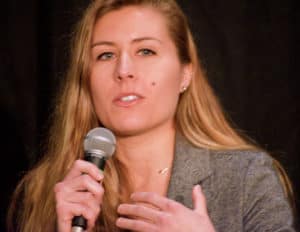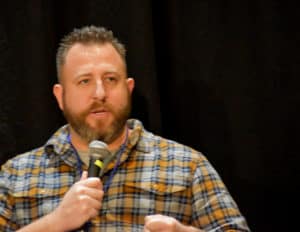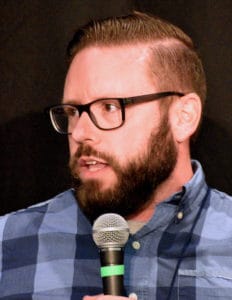HARRISBURG, Pa. (BRN) — As part of the Baptist Resource Network (BRN) of Pennsylvania/South Jersey annual meeting, BRN Executive Director Barry Whitworth moderated a panel on reaching millennials. This panel consisted of Steve Marfia from Legacy 242 in Deptford, N.J.; Alex Hanevich from Horizon Community Church in Bryn Mawr, Pa.; Autumn Miller and Kayla Smith from New Life, a Penn State University collegiate ministry in State College; Jay Francour from Cultivate Church in Voorhees, N.J.; and Bao Pham from Drexel University’s collegiate ministry in Philadelphia.

Whitworth began the panel by asking, “What do people say about millennials that is not true?” To which, Pham explained that many people think millennials are lazy, but insisted that was not actually true.
“We love to learn, and we love to have someone to learn from,” he said, explaining millennials often are not sure where to start with responsibilities if they do not have guidance. “We want to have someone respect us and guide us,” he clarified.
Miller agreed, noting she often hears people say millennials are lazy and do not work hard. She explained that she thought this was because when millennials were young, the message they always received was that they could do anything they wanted when they grew up. Instead of empowering them, though, she felt this actually made them unsure about what they were actually passionate about.
“When we find what we are passionate about, we will give it everything we can,” Miller exclaimed.
Agreeing, Marfia said, “We grew up with parents who were so hardworking that we feel like we missed something. We want a calling so high that we feel like it is worthy of giving our lives to.”
“What are some positives that make you proud to be part of your generation?” Whitworth asked next.
Hanevich expressed excitement over the questions, questions he feels will help the church become stronger and healthier, that millennials are forcing the church to ask. Francour agreed and said one of the proudest things he feels about millennials is “watching this generation overcome barriers previous generations thought were insurmountable” regarding having gospel conversations.

Smith said that what excites her is that millennials are “not okay with settling. They always want to improve themselves and whatever organization they are a part of.”
Pham expressed pride in the fact that his generation can be a bridge between the older generations and the younger ones in the church, particularly in a multi-ethnic situation.
“We know both cultures and generations and can bridge the gap between the two,” he said.
Whitworth next asked, “What are the barriers keeping your unchurched friends from coming to church?”
Francour explained the gospel is the good news of Jesus that makes whole the things that are broken, but “one of the main discontents millennials feel is that the gospel is a solution to your afterlife not a solution to the brokenness in our world today.” He explained millennials are drawn to a real world gospel that speaks to the current issues they see now—like sexism, racism and injustice.

Marfia agreed that an incomplete view of the gospel was a barrier to millennials coming into the church.
“Our gospel cannot just preach heaven for later, but heaven inside us now by God’s Spirit. We need to say what we are saying and more!” he said.
Smith explained that she did not come to Christ until she was 20. A barrier for her, she said, was the idea one had to fit a certain mold in order to go to church, and she simply did not think that was a mold that fit her.
She also said scripture could be a barrier, but a healthy barrier that millennials can overcome if the church does their part.
“So many people see Christianity as a set of rules,” she explained. “When they can see the church is made up of many backgrounds, ethnicities and schools of thought — that there is space for them — that warms them up to come into the church.”
Whitworth ended the panel with a final question, “What is one word of practical advice you would give to the church?”
Pham spoke first, “We love the church. We love God. We love people. We are young and opinionated, and we like change. We like to fix things because we care a lot. We are prideful sometimes, but be patient with us, love us. Do not dismiss us as young and that we do not know what to think. We do see things differently because we have grown up in different environments. We speak up not because we want to cause divisions, but because we care!”

Marfia agreed, “We respect the heart and the passion and the legacy of so many pastors and churches. We need the support and partners between generations. Our generation may seem secular and far from God, but they are open to Jesus, they just aren’t open to church!”
Francour concluded by saying the American culture has shifted, and we must see our communities as a mission field. He explained that missionaries learn their culture in order to reach their culture.
“To expect this mission field to meet us in our current form of ecclesiology is to ask the culture to be the missionaries,” he stressed, “instead of asking us to give up our ecclesiology for the sake of the mission.”
*Editor’s note: the author took part in this panel discussion.